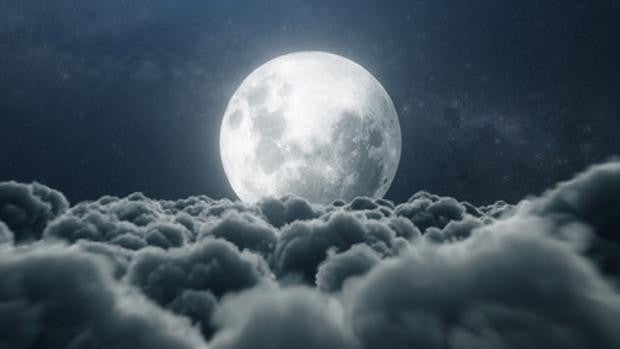 The moon has always been a source of inspiration for popular legends. In our collection we find some very sophisticated ones, such as the one about men who transform into wolves when there is a full moon, and other less fanciful ones, such as those related to fertility.
The moon has always been a source of inspiration for popular legends. In our collection we find some very sophisticated ones, such as the one about men who transform into wolves when there is a full moon, and other less fanciful ones, such as those related to fertility.
The fact that the lunar cycle lasts almost as long as the menstrual cycle has led confirmation biases to do the rest. However, today it seems that there is no relationship between a certain lunar phase and a greater frequency of births or pregnancies.
The belief that the full moon can disrupt human behavior is also deeply rooted in culture, language, and folk wisdom. Not in vain, the Dictionary of the Spanish Language includes the term 'lunatic' and defines it as "suffering from madness, not continuous, but at intervals." However, although throughout history the full moon has been blamed for the worsening of various psychiatric disorders, the truth is that most of the evidence points, today, to the fact that the moon is innocent. .
Some authors consider, however, that current light pollution could mask the light reflected by the full moon, preventing its effects from being detected today (with some exceptions). They do not rule out that in previous centuries, without electric light, that natural night light could alter moods in some way.
In fact, recent work has shown some synchrony between mood variations in patients with rapid cycling bipolar disorder and lunar cycles. The author of this study suggests that a part of the circadian system (the internal clock) of the patients would be synchronized to lunar days (24.8 hours), while other components of the clock would remain synchronized to solar days of 24 hours.
Desynchronization between biological rhythms, including sleep, could be behind the transition from a depressed to a manic state in these patients.
How do we sleep with a full moon?
Although there is still controversy on this matter, the truth is that some works have been published in which it has been observed that sleep latency, that is, the time it takes us to fall asleep, increases in the days before the full moon. In addition, deep sleep, slow wave sleep, could be reduced on those days.
Already in 2013, a work published in 'Current Biology' and led by Christian Cajochen pointed to the effect of lunar phases on aspects of sleep evaluated by electroencephalography. The volunteers slept 20 minutes less on average and had 30 % less deep sleep in days before the full moon.
The researchers also highlighted an important aspect of the study: its retrospective nature. None of those involved in the data collection process were aware that it was about evaluating the possible effect of the lunar phases. They evaluated sleep with a completely different objective, and it occurred to them to analyze this factor years later, having a drink on a full moon night. That eliminated any bias at a stroke, and also the possible placebo/nocebo effect.
Earlier this year, a team of researchers including Leandro Casiraghi and Horacio de la Iglesia published a work in 'Science Advances' that confirms these results. In this case, they did so through ambulatory monitoring (with a wristband device) of Argentine indigenous tribes (with and without access to electric light), and of a highly industrialized American population. In all three situations, the results were similar: the full moon delayed bedtime and shortened sleep duration.
Is the light to blame?
But what aspect of the full moon makes us (supposedly) sleep less? It is clear that on full moon nights there is more light, especially if we do not mask it with electric light. However, in both studies the effect of light reflected by the moon was ruled out.
In the first case, because the volunteers' sleep was recorded under controlled laboratory conditions (without receiving light from outside). In the second, because both the tribe without access to electric light (with less light pollution and greater potential influence of moonlight) and the tribe with access to electric light and the industrialized population showed similar effects.
It is not clear if this is an endogenous rhythm that we maintain or if our body is sensitive to the effect of gravity exerted by the moon in its different phases. If it were the latter, Casiraghi and his collaborators explain that, although the gravitational force would be the same on a full moon and a new moon, each one occurs at different times.
Thus, the full moon is the only one that would exert this effect during the night, when we sleep. Other authors, however, rule out that the moon's gravitational force can have any effect on masses as small as our body.
In any case, the possible stimulating effect of the full moon would be the result of the adaptive advantage of being more active on those nights when there was more natural light to see around us.
Like everything around the moon, its effect on sleep is also a mysterious matter… for now. Little by little science will continue to make its way.
Until then, if you feel strange on full moon nights, fear not: you may just have a harder time falling asleep.
María Ángeles Bonmatí Carrión. CIBERFES postdoctoral researcher and associate professor UMU, University of Murcia.
This article was originally published on 'The Conversation'.
<img src="»https://counter.theconversation.com/content/170483/count.gif?distributor=republish-lightbox-advanced»" alt="»The" conversation» width="»1″" height="»1″" style="»border:" none !important; box-shadow: margin: 0 max-height: 1px max-width: min-height: min-width: opacity: outline: padding: !important» />
